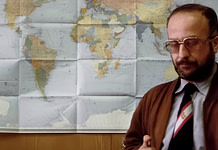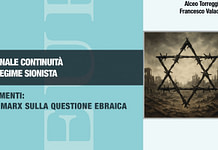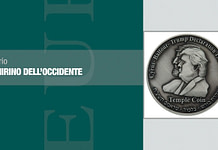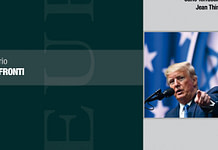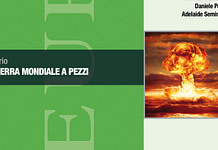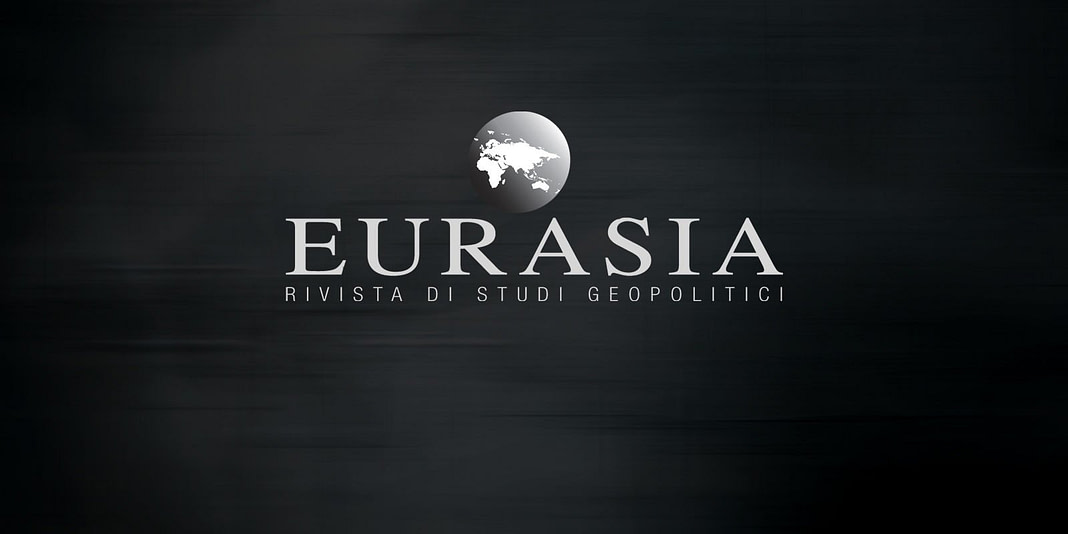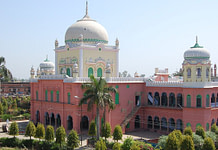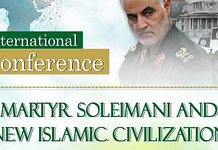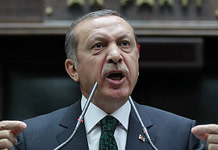Source: http://win.ru/en/school/6294.phtml
Despite the huge means put in place to sabotage the relations between Italy and Russia, in particular through the piloted “scandal” of Wikileaks and then attempting to overthrow the government of Silvio Berlusconi — which I discussed in a recent article — the efforts of Westerners/Atlantists do not seem to have been successful so far. Although in Italy, in parliament and in the mass media, there is a wide and heterogeneous odd assortment of forces hostile to Russia that have their reference points in Washington, London and Tel Aviv, 2010 ended with an extremely positive balance for the ties between Italy and Russia. The attempts to undermine the Italy-Russia relations have not achieved the expected results, at least at this moment, since Italian foreign policy does not seem changed at the end of 2010 and 2011 is looming an important year for the further deepening of the relations between the two countries. Now let’s see what are these special ties between Italy and Russia, that so much concern the Atlantists.
Italy-Russia “dangerous liaisons”
Many economic and political agreements were signed between the two countries in 2010, reinforcing the Rome-Moscow axis, as a confirmation of a cooperation across the board in progress since some years and improved by the current Berlusconi’s government. The more active Italian foreign policy reflects Berlusconi’s desire to be seen as an important European player, but also the interests of big Italian companies. For example, in last December, in full of the “scandal” Wikileaks, Berlusconi, with six Italian ministers in tow, met with Putin and Russian President Dmitri Medvedev in Sochi on the Black Sea. In the course of the inter-governmental summit at Sochi they signed seven new agreements between Italy and Russia. Seven agreements which range from defense to the energy sector from the banking to the postal and to support small and medium-sized enterprises, from the readmission agreement to a bilateral partnership for modernisation*. These agreements involve large Italian companies such as Finmeccanica and Enel and several major Italian banking groups.
Economic ties between Russia and Italy are growing stronger as well as bilateral trade reached an unprecedented 26,6 billion euros in 2008. In 2009 trade volume decreased by 30% due to the effects of the global financial crisis. But for 2010 (there are no definitive data yet) it will be at least at level of 2008 and maybe more, since the italian officials set a goal of doubling trade between Russia and Italy, by the end of 2010. Over the last few years the relationships between Russia and Italy have achieved excellence and among European Union countries Italy is the one whit the tightest connections with Russia. The excellent bilateral relations between Moscow and Rome could pave the way for greater economic cooperation. While Russia is well emerged from the worst phase of the economic crisis, for Italy the road to recovery looks longer. Nonetheless, there is clear potential in their economic cooperation that go beyond oil and gas sale. Already now the nature of these reciprocal interests is various and quite rich.
From the political point of view, Italy is the right support for Russia’s relationships or admission’s plans in several western international organizations, such as EU, WTO and OECD. Concerning the NATO, Italy said no to the expansion of the alliance close to the borders of Russia and called for permanent NATO-Russia talks. Relations between Italy and the Russian Federation have been nurtured through numerous high level meetings and agreements in last years: the State visit to Russian by Italian President of the Republic Napolitano in July 2008; the Minister of Foreign Affairs Frattini’s visit to Moscow in September 2008, during the Russia-Georgian crisis; the Italy-Russia governmental summit held in St. Petersburg on the 7th of November 2008 (the previous one was held in Bari in March 2007); Prime Minister Berlusconi’s meeting with President Putin in Istanbul on August 3rd and the enlarged intergovernmental summit in Rome on the December 3rd, 2009. During 2010 were held various Italy-Russia summits like that one of April 26 in Milan or the aforesaid Sochi summit in December. Many times Berlusconi flew to Russia to meet Putin and Medvedev.
As far as trade is concerned, Italy exports different goods to Russia, such as machinery, mechanical equipment, apparel, leather products and furniture products, while Russia is mainly exporting natural commodities. At the moment approximately 500 Italian companies are estimated to work on Russian soil. The main fields in which they are operating are high technology and telecommunications, mechanical machinery and equipment, auto, household appliance manufacturing and banking. In June 2009 Italy and Russia signed the Treaty for the Prevention of Double Taxation, which would further boost the commercial ties between the two countries. Recently, Russian and Italian Research Ministers launched a joint research study on nuclear fusion. The project is to build a nuclear reactor just outside Moscow. Besides being an important partner in energy field, Italy is also one of the biggest importers of gas from Russia: in order to strategically facilitate the delivery, in 2012 will start the construction of the South Stream pipeline, supposed to be ready in 2015. The project involves Gazprom and Eni.
Some of the leading Italian Companies in the Russian Federation
Eni started operating in Russia already during the Cold War, when the then-head Mattei signed with Russia an agreement of exchange of Russian oil with Italian items (rubber, pumps, pipes, compressors). At the end of the 1960s Eni and USSR started the construction of the pipeline TAG that in 1974 started bringing gas in Italy through the Austrian soil. It was in those years that cooperation between Eni and Soviet government expanded to the delivery of machinery for energetic facilities. In recent times a strategic Netherlands based joint venture with Gazprom started the realization of the Blue Stream pipeline going from Russia to Turkey. The partnership with Gazprom turned out to be utterly long termed: in 2006 they signed an important agreement aimed to launch joint projects in the mid and downstream gas, in the upstream and in technological cooperation. In June 2007 the companies subscribed a memorandum of understanding for the realization of the South Stream pipeline, linking Russia and Europe through the Black Sea.
Another leap forward in operating in Russian market was the agreement with TGK-9, which Eni signed in June 2008 through its company Eni-Energhia and allowed Eni to sell gas in Russia. Eni’s projects in Russia are still flourishing and expanding. In October 2009 Eni, Calik Holding, Transneft and Rosneft signed an agreement for the implementation of the pipeline Samsun-Ceyhan.
Unicredit is an Italian bank, head quartered in Milan. It is operative in Russia since 1989, when it was founded in Moscow under the name of International Moscow Bank. In 2001 it merged with Bank Austria Kreditanstald, also present in Russia. The crucial step occurred in 2005, when Bank Austria joined Unicredit, which in this way started operating in Russia. Since 2007, when International Moscow Bank changed its name in Unicredit, it started operating under this brand. At the moment Unicredit is widely spread all over the Russian Federation, it has more than 100 offices, 3700 employees, a capital of 64.2 bln roubles. Forbes rated Unicredit at the sixth place among the most trustable banks of Russia.
Enel is the third larger energy provider in Europe and the biggest in Italy, Spain and Slovakia. It delivers energy (gas and electricity) to more than 61 millions clients. The first step in the Russian market was made in 2004, when in partnership with ESN Energo it awarded the management of the electric plant North-West Thermal Power Plant (NWTPP) in Saint Petersburg. The management turned out to be extremely efficient and successful from different points of view: the plant nearly doubled its capacity and it was the first Russian central to receive a certificate of environmental quality. On the basis of this success, Enel in 2006 acquired a 49,5% share of RusEnergoSbyt, the major independent energy trader in Russia. In 2007 Enel and Rusatom signed an agreement of cooperation for the development of nuclear energy. In the same year, in a joint venture with Eni, Enel acquired gas deposits, which would be joined to Russian main pipelines on the basis of an agreement signed with Gazprom. After the acquisition of a share of OGK-512 in 2009, Enel is further operating on the Russian market. The plants owned by OGK-5 will be improved and implemented, in order to increase their productivity and security and to minimize the environmental impact. Other plants are planned to be opened on the Russian soil. On October 14th, 2010, Enel and JSC Interregional Distribution Grid Companies Holding (IDGC Holding) signed a memorandum of understanding. The two companies will carry out joint projects related to the development and implementation of smart grids, including automated meter management systems based on smart meters, in Russian electricity distribution network.
Fiat’s presence in Russia roots back in 1966, when it helped some Ussr car’s industries to open a production plant in the town Togliatti. The new firm was called AvtoVAZ and started to produce a small “people’s car”, called Lada, on the basis of the 124 Fiat model, adapted to though weather and street Russian conditions. The production evolved and became more independent from Italian contribution: already in 1977 the body and the four-wheel drive system of the Lada Niva were totally designed by the AvtoVaz. In 2008 Fiat and Sollers had already announced some joint ventures to produce and sell Fiat cars in Russia. On the February 11th, 2010 it was announced that the joint venture would put on the Russian market up to 500.000 cars per year by 2016. The 50-50 joint venture is supported by a 1.2 bln euros loan by the Russian government. A new production plant will be opened in Tatarstan and will host the production of several models from Fiat and Chrysler Group. Finally, Italian Defense Minister La Russa announced, at the summit in Sochi in December, that the state corporation Russian Technologies is to set up a joint venture with Fiat Group’s Iveco truck division to supply 2500 LMV M65 light multi-purpose military vehicles Lince for the Russian army.
Finmeccanica operates in the Russian market since 1967, when the first representative office was opened in Moscow. Already in 1970 Selenia (a Finmeccanica company) provides control centers in Moscow, Kiev and Mineral’nye Vody with radar that are still active. From these first steps, Finmeccanica has steadily increased and expanded his interest in the country, expanding its operations in many strategic areas and high technology sectors. Taking advantage of strong political, economic and cultural relations between Italy and the Russian Federation, the company’s goal is to establish a durable cooperation with local partners, developing a powerful industrial base in the Russian Federation. Finmeccanica currently work in the fields of defense, aerospace, security, automation, transport and energy.
Italy and Russia boost their strategic partnership
Two great events will herald at the beginning of 2011: this year will be the year of Russian language and culture in Italy and Italian language and culture in Russia. This is one of the agreements reached in 2008, during the summit in Moscow between President Medvedev and Prime Minister Berlusconi. The calendar of events provides an important exchange of exhibitions, concerts, readings, theater festivals, which are working coordinators appointed by their respective governments, Giuliano Urbani, and Mikhail Shvidkoy.
Furthermore, Russia and Italy intend to conduct joint naval and ground force exercises during this year, this is the second great event announced for 2011. The relevant agreement was reached between the defense ministers of both countries in the negotiations in the city of Sochi, on the Black Sea, in December. The Russian Defense Minister Anatoly Serdyukov and his Italian counterpart Ignazio La Russa also discussed other aspects of bilateral military cooperation, including the drafting of an intergovernmental agreement on the prevention of incidents at sea, mutual visits of ships in Russian and Italian naval bases, exchange programs for students of military academies, exchange of experiences on military medicine and on high altitude training.
Last but not least, 2011 will see the implementation of Italy-Russia Partnership for modernization agreements. The “Partnership for Modernization Project” is a document prepared for the EU-Russia summit that has taken place in Rostov on the Don on May 31st last year, would allow both sides to intensify their economic and technological cooperation. In this document it is stated that it came the time for Russia to establish tighter relationships with the European Union as a whole in order to help the Russian economy emerging from the economic crisis. All EU members are named in the document, except Poland and the UK, with which the Russian Federation has recently had troublesome diplomatic relations. In particular, the document highlights three countries as crucial for commercial alliances:
• Germany, for the Nord Stream Pipeline and the Airbus A350 project;
• France, for the opening of car factories of Renault, Peugeot and Citroen on Russian territory, as well as for the cooperation between Gazprom and EDF (Electricitй de France), the joint space program in Guinea and the Belene nuclear plant in Bulgaria;
• Italy, for involvement in South Stream, for the upgrade and renovation of Russian railways, ports and airports and cooperation in the Sochi 2014 Winter Olympics.
Finally, during the telephone conversation for New Year’s wishes, Dmitry Medvedev and Silvio Berlusconi, in addition to the exchange of greetings, reiterated their willingness to expand bilateral cooperation. In 2011, Italy and Russia are aiming at a more close cooperation and, expressing the willingness to boost mutual economical and political cooperation, they have beaten the Western plot to damage the deep ties between the two nations.
Antonio Grego, historian, international relations analyst, journalist. Copy editor for the italian journal Eurasia, devoted to geopolitical studies. Lecturer and member of the Institute Enrico Mattei of Advanced Studies for the Near and Middle East (IEMASVO). Author of “Figlie della stessa lupa. Storia dei rapporti tra Italia e Romania alla vigilia della seconda guerra mondiale” (Fuoco, Rome 2009).
Questo articolo è coperto da ©Copyright, per cui ne è vietata la riproduzione parziale o integrale. Per maggiori informazioni sull'informativa in relazione al diritto d'autore del sito visita Questa pagina.








